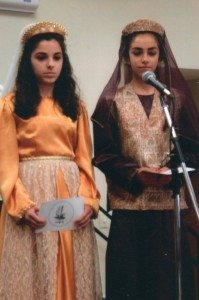By Tom Vartabedian on August 4, 2015 in Tom Vartabedian // 7 Comments //  //
// 
The above question was posed to me some time ago by a 12-year-old girl attending Armenian School at my church.
I was her instructor and the dilemma was all too familiar. Many students have pondered that same thought, assuming the Mother Tongue was a lost language in America and a complete waste of time to learn.
But the language she felt was superfluous as a child suddenly became imperative when she visited Armenia—the land of her dreams— this year as a college intern, and toured the many villages and orphanages along her path.
It was her first venture to the country, but not her last.
In addressing a class of students she was once a part of, the coed admitted how critical she had felt toward the language until she visited Armenia.
“I got to understand what they were saying and they understood me,” she told her younger peers. “You don’t realize how important that becomes until you are forced into using it. Take the opportunity to learn the language of your ancestors and you won’t regret it. Trust me!”
Perhaps that young woman mirrored my sentiments when, as a teenager, I was being introduced to Armenian School at the former Holy Cross Armenian Catholic Church. My mother insisted. There was no compromising. Learn Armenian or else.
What she failed to mention was that I was being raised in an Armenian household with a grandmother at my disposal who communicated the language in a modified dialect, using Turkish words. By the time I attended school, I was fluent in both tongues.
But speaking a language is one thing; reading and writing it are another. That comes through schooling and discipline.
I marvel at how well spoken many American-born individuals are in Armenian. You would never know they were not immigrants, and sometimes appear better versed than many natives. My priest (Father Stephan Baljian) is one of those diversified linguists with an impeccable delivery, especially with his sermons. Credit his parents and the schools he attended as a child before entering the seminary.
Teaching Armenian to today’s generation is no simple task. Most are there because they have to be. Others find every excuse not to attend. The role of an instructor is an ongoing challenge. But continue we must.
It’s been insulting at times when they can’t find their papers or textbooks. Discipline is not what it used to be a generation back with their parents.
My young protégé was a work in progress. Now, she’s giving presentations on her trip and opening with an Armenian dialogue, evidence of her innate ability. So why not showcase it as an example for others?
In this ever diverse society, harried and often confused, the motive to learn Armenian is not easy, especially if there’s no such language spoken at home. And those who don’t exercise it will lose it, much the same way I lost five years of French in high school.
I must confess, we didn’t do much to assuage the problem, using English as our principal language and Armenian for special occasions. Perhaps we would have been better off reversing the trend.
In my constant search to exercise the language, I look for opportunities to avoid mortality.
It might be at church, a gathering, perhaps a shop owner in Watertown. It could be an immigrant, an ethnic cruise given the international flare, or simply looking in the mirror and speaking to myself. My wife and I are almost totally English-speaking, despite our grasp on Armenian.
Language is supposed to be a vehicle of thought, but all too often it is just an empty car full of gas. It needs to be accelerated now and then.
I tell my students that my teaching them would be an utter waste of time if they didn’t pay attention to the classwork. I explain to them the potential of maybe teaching their parents once they become somewhat fluent. They take home words and show some initiative.
At the end of the term, putting a sentence or two together becomes the ultimate reward.
The graduate student was well informed with her message to the children.
“I feel fortunate to have the ability to carry this language into the future,” she explained. “We owe it to our ancestors to keep the heritage alive. To save it, we must learn it, speak it, and pass it along to others.”
Having been to Armenia twice and introduced to an entirely different dialect, it took the second trip before I really caught on to some of the nuances.
One day, these students will see the light. They will take pilgrimages to Armenia and face the barriers. Or show the willpower now and become engaged. The choice is theirs to make.














